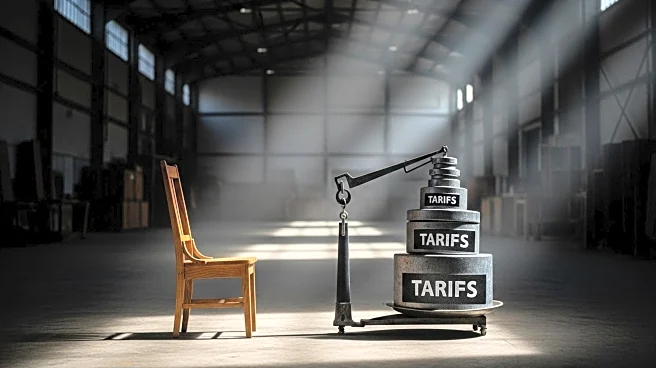What's Happening?
President Trump has announced new tariffs on imported furniture, aiming to boost domestic manufacturing in North Carolina and other regions. The tariffs, which include a 25% increase on imported kitchen
cabinets, sinks, and veneered wooden furniture, are set to rise further in January. This policy is intended to revitalize local production, which has suffered due to global supply chains. However, industry leaders, such as Alex Shuford, CEO of Rock House Farm Furniture, warn that these tariffs could have unintended consequences, potentially harming firms with thin margins and exacerbating the skilled labor shortage. While some manufacturers may benefit from a more protected market, suppliers dependent on imports face financial risks and higher prices for consumers.
Why It's Important?
The imposition of tariffs by President Trump is significant as it seeks to restore jobs and manufacturing in the U.S. furniture industry, particularly in North Carolina, which has seen a decline in local production due to globalization. The tariffs could potentially bring back some jobs, but experts caution against expecting a full revival of the industry. The shortage of skilled labor remains a major hurdle, and the increased costs could lead to higher prices for consumers. The broader impact on the supply chain and the industry's reputation abroad are also concerns, as tariffs may not effectively address the underlying issues facing the industry.
What's Next?
As the tariffs increase in January, stakeholders in the furniture industry will need to navigate the financial implications and potential shifts in supply chains. Companies may need to invest in developing skilled labor and modernizing production to mitigate the impact of tariffs. Retailers and distributors, who play a crucial role in the industry, may face challenges in adapting to the new market conditions. The long-term strategy will likely involve balancing imports and domestic production to ensure stability and reduce price volatility.
Beyond the Headlines
The new tariffs could lead to a long-term shift in the U.S. furniture industry, affecting consumer prices and the availability of skilled labor. The industry's dependency on global talent and the potential harm to its reputation abroad are critical considerations. The impact on American consumers, who may face higher living costs, will require careful assessment and strategic planning to ensure the industry's future viability.








